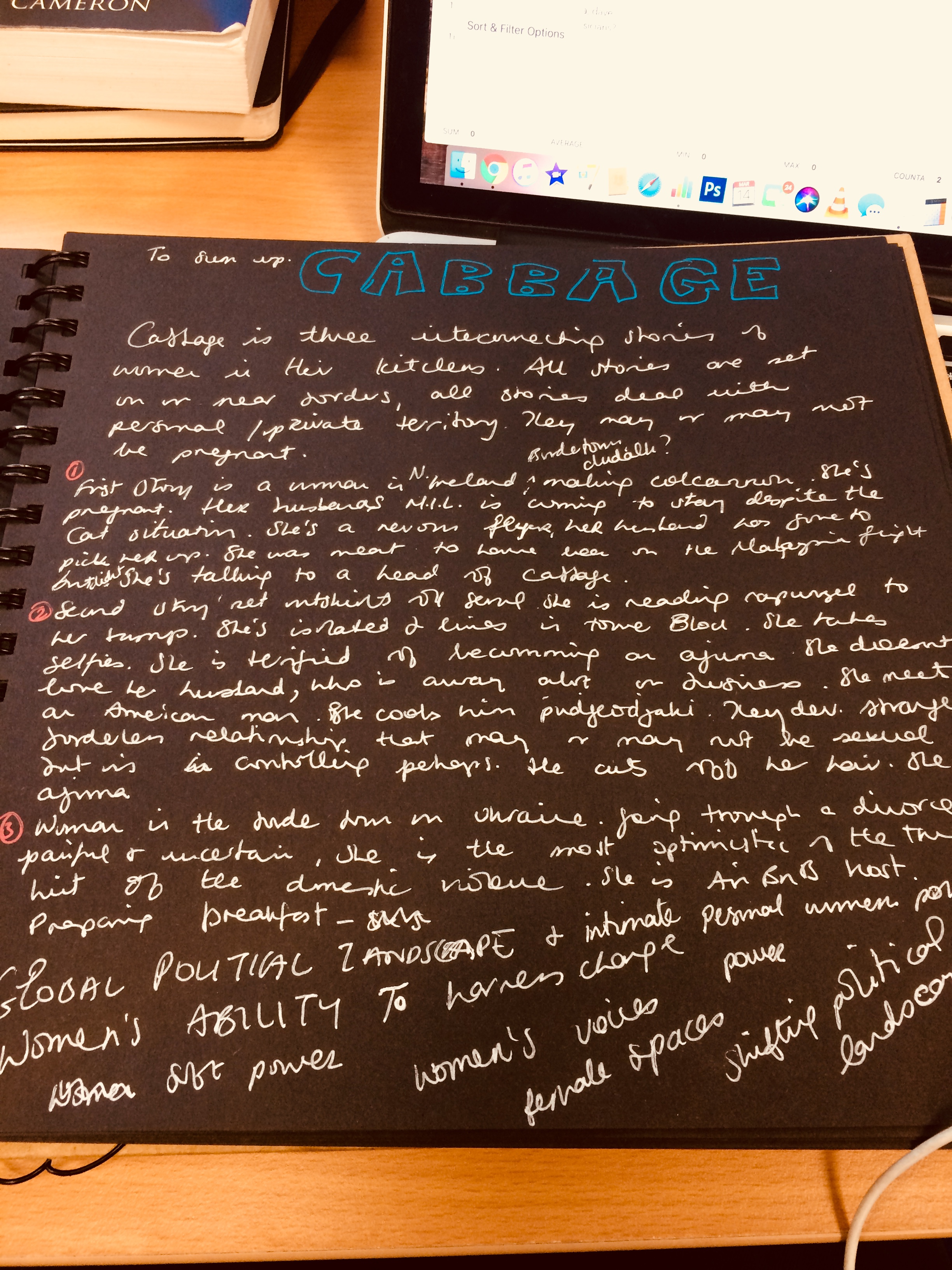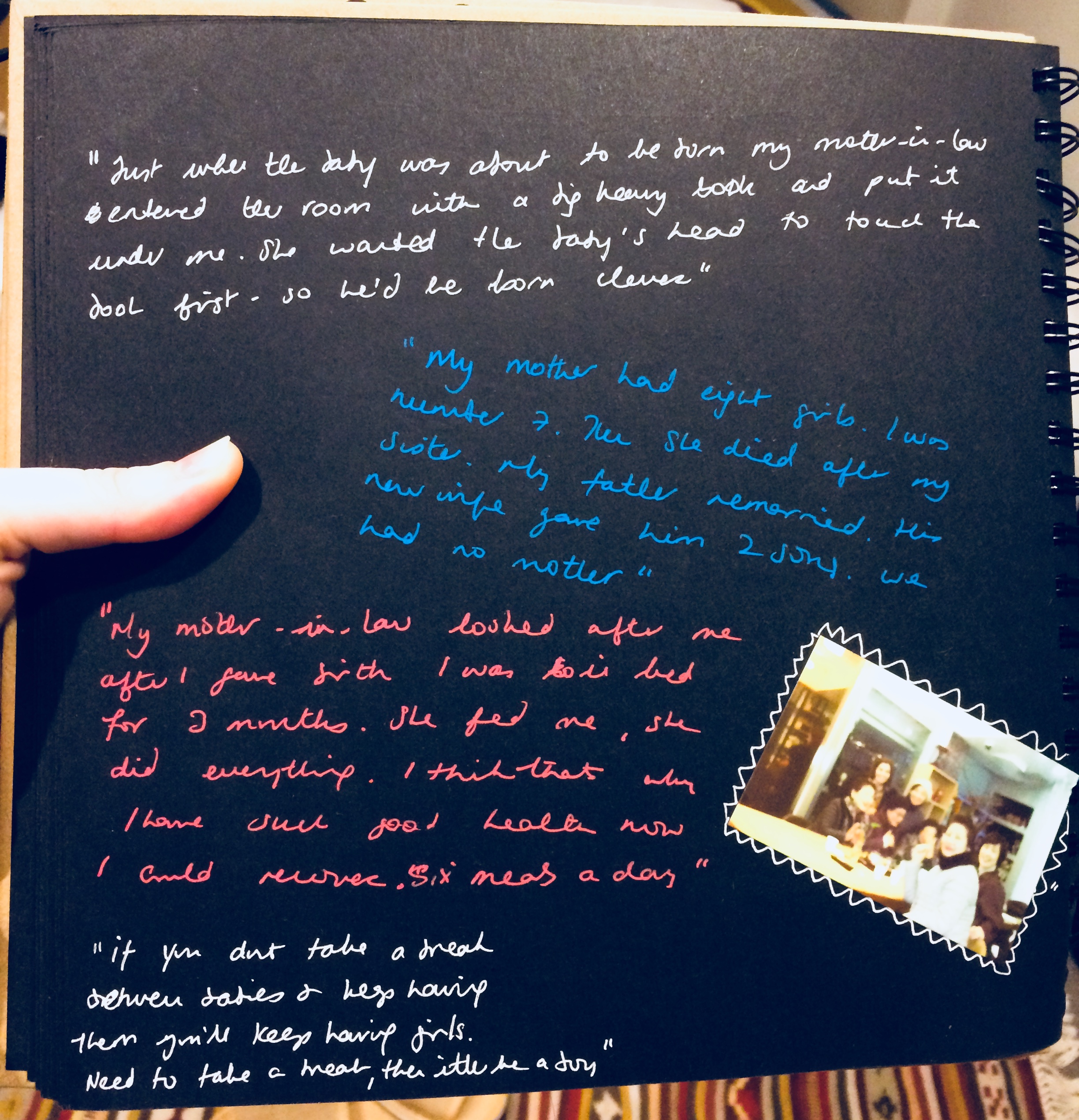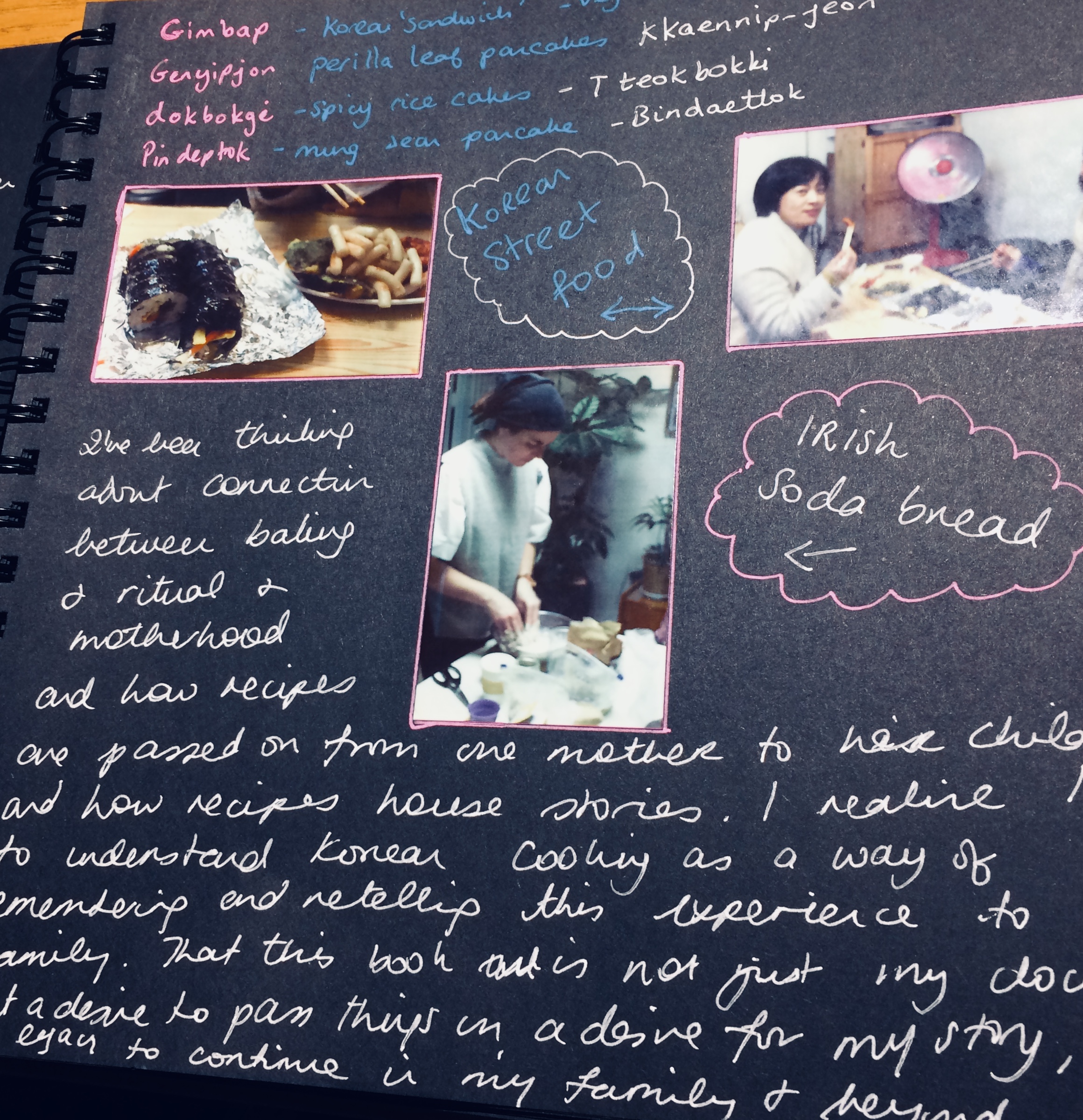This is a story about a woman coming to terms with a secret she discovered after her mother death. This secret has blown apart who she thought her mother was and thrown her own identity into question. In grief, and in search of answers, she starts making recipes from her mother’s cookery book.
Essential Ingredients
This project has been laying dormant at the back of my brain since May. (Fermenting like good kimchi shall we say!). Today having a few hours without baby, it suddenly jumped into action and ideas have been bouncing around my head all morning.
Up to this point I have been describing Cabbage as “A story with three women in different kitchens around the world. Women who live on borders. Like N. Ireland, South Korea, Ukraine. And that it’d be performed in kitchens. With songs. And with cooking.”
I still really like the title. ‘Cabbage’ because its simple, its mundane, for me this word conjures up an overcast Wednesday morning, or a Sunday at the laundrette. I like that. I want this project to celebrate everyday mundandity. So the title stays. But something about the content doesn’t feel quite right. Perhaps it’s the fact that I don’t feel comfortable giving voice to women from very different cultures. Experiences that I can only look at as an outsider. For it to be authentic, it has to be real. Or come from a place of truth.
Also the form as described above feels too busy, too complicated. (Its a play, its site specific, its a musical, its got cooking, its a story, its got three different women, its about politics… ) In cooking the best dishes are always simple, not too many flavours. So breaking it all down, the essential ingredients of Cabbage are:
Me
Songs
Recipes
Different global viewpoints of women in their kitchens
Which got me thinking, what if Cabbage was a sung recipe book, taken from different women in their kitchens around the world… Now that, to me, sounds tasty!
Baby love
I had intended to write and perform Cabbage before this little fella arrived, but that was not to be the case - Turns out that getting married, moving house and having a baby within three months makes finding time for writing or even heart space for inspiration, somewhat difficult! So I've put Cabbage on the long finger for now. Motherhood is already providing a whole new perspective that no doubt I will draw on.... I'll be posting here again but for now I'm just focusing all my attention on this little guy.
recipe books
This is my mother's recipe book. Most of it was written into around the time I was born. All through my childhood it lived on the countertop among the daily debris of our kitchen life, among the bills and homework and never tidied away. So much a part of my mother's kitchen that it feels strange to have it here with me in Brighton now. The pages are food stained and faded and browned, the cover of the binder has long fallen off. There are doodles and scribblings from me and my siblings. Each recipe handwritten, in neat blue ink and I'm surprised how much my mother's writing looks like my sister's. An appendix of dishes - ones that were treasured in our house growing up - like 'scuffles' and 'chocolate biscuit cake'. And other ones that I've never heard of 'Picnic Pie' or 'Cold meatloaf' And the name of the person who gave mum the recipe is neatly written on the top right- hand corner.
In my research, I started looking up old handwritten cookery books that are for sale on eBay. But there is something excruciatingly personal about these items. It doesn't feel right. It's like bidding on and buying someone's diary, someone who has passed away, so I can't tell the stories beyond the dishes. Some of these books have newspaper clippings, old letters stuffed inside, prayers. A book like this is deeply personal and a record of something much more than food. I keep returning to this idea of the domestic as a sacred space. And if so, the cookery book is like the principle text to access this world. It's the scripture of a universe inhabited by women.
What this has got to do with cabbage I have no idea.
Funding!
The amazing people at Arts Council England are once again supporting me to make a show. I am so grateful to this fantastic country for continuing to allow me to do what I love doing! I'm going to spend the next 5 weeks researching, writing, singing and cooking to put together an idea of what 'Cabbage' could be.
I've been a bit quiet lately as there has been lots going on with me personally ... in the past month I got married, moved house and I'm expecting a baby in 6 weeks time! So I have been busy busy! Which is hard to keep creative ideas afloat when life is demanding so much (and with tiny little feet dancing in your belly!) but oh how I would love to get this little show off the ground before I take maternity leave.
So what is 'Cabbage' you ask. Well, I chose it as a title because it is a lovely rounded word. Cabbage. It falls out of the mouth easily, layers of veined leaves, soft on the edges. And yes, cabbages are plain, unimaginative and slimy but they are also mystical, regal and sensual. They are teeming with associations to pregnancy (rapunzel, cabbage leaves for breastfeeding, cabbage patch babies) and its hard to deny their unusualness within the vegetable kingdom as being the weight and size of a human head. They are the lingering miserable smell of a bedsit and yet the super-food curative ingredient with life-giving properties. They are beautiful to look at. And they are overlooked.
Now, I know that I don't want to write a show about Cabbage. And lets be clear here, there will be no cooking of cabbage during this show. (can you imagine? the reviews could write themselves! ) But I guess I wanted just to have that contrast of the alchemy mixed with the ordinariness as the central theme.
I had thought this show would be three very well defined stories (see my post from January) but now more and more I'm thinking about the personal. About stories that exist in recipes that we cook, things that are handed down. About women that we love. About women in recipes. And the quiet power of women in kitchens all over the world. The intangibleness of the love and strength thats poured into preparing food for a family.
Cabbage
CABBAGE - some thoughts on a new show
Cabbage is three interconnecting stories of women in their kitchens. All stories are set on or near borders, all stories deal with personal/ private territory. The women may or may not be pregnant.
1. First story is a woman in N. Ireland making Colcannon. She's pregnant. Her husband's mother is coming to stay despite the whole 'cat situation'. The mother-in law is a nervous flyer so he has gone to pick her up. She was meant to have been on that Malaysian flight that got shot down over Ukraine in 2014 but she wasn't. She's talking to the head of a cabbage.
2. Second story set on the outskirts of Seoul. Woman is reading Rapunzel to her bump. She's isolated and lives in a tower block. She takes selfies. She is terrified of becoming an 'Ajuma'. She doesn't love her husband who is away a lot on business. She meets an American man and cooks him Budae-jjigae They develop a strange borderless relationship that may or may not be sexual but he is controlling, perhaps. He cuts off her hair. She is 'ajuma'.
3. third story is a woman on a bordertown of Crimea and Ukraine. Not too far from where the plane crashed. She is an air bnb host preparing Golubtsi for her guests for breakfast. She's going through a divorce. Painful and uncertain. She is the most optimistic of the three. Perhaps able to hints of their complicated relationship. (reference here Ciaran Brady's essay on Ireland/ UK "In the shadow of the fond abuser")
Global, political, landscape
Intimate/personal sexual politics
Womens' ability to harness change
Soft power
women's voices
Female Spaces
Power shifts
Korean Lullabies
Pipi has been teaching me a Korean lullaby. Here is a recording of her, I could listen to it forever.
I've been doing a bit of research on lullabies in general. Its interesting how they are international, every culture in the world sings songs to babies. The quality of the singing doesn't matter, the baby doesn't mind if you go out of key, but its mostly about that connection between baby and carer. In some cultures lullabies are quite dark, even the most well know of lullabies like this one:
Hush little baby
On the treetop
when the bough breaks
the cradle will rock
When the bough breaks
the cradle will fall
down will come cradle
baby and all
Its actually a little scary when you think about it, who puts their baby in a tree? And who wants the cradle to fall out of the tree and what happens to that baby? Well, apparently the reason why lullabies are quite dark is for stress relief for the mother. By singing her fears out loud she soothes herself and her baby at the same time. I always find singing such a huge stress reliever, so this makes a lot of sense.
Meeting the pregnant women
Meeting the mums
Meeting the grandmothers - Helmani
We spent an afternoon drinking tea and chatting to 4 grandmothers about their experiences of motherhood and pregnancy.
Borders
I have always thought of land borders as permanent entities, that they don’t move, in the same way as lakes or mountains. But instead I’m beginning to see them more like stories that we all tell and retell each other til we render them infallible. The border separating Ireland and Northern Ireland was not something that ever seemed possible to even discuss, so politically charged and sensitive a topic. But in the last few years and with conversations surrounding Brexit and the potential fallout from a dismantled United Kingdom, other things, other stories, seem chaotically possible. Being here in Korea and trying to understand its complex relationship with its northern counterpart has got me thinking about ideas of borders and divisions within nations, and how we define ourselves by what we are not. Here's a podcast from BBC Radio 4, an interview with an author Garret Carr who spent 2017 walking along the border of Ireland and Northern Ireland.
He asks "can a border also be a place, not just a divider, but a place where people can meet, can it be a place rather than a void?"
Cooking and eating
I've been thinking about the connection between baking and ritual and motherhood and how recipes are passed on from mother to children and how recipes house stories. I realise I want to understand Korean cooking as a way of remembering and retelling this experience to my family. That this book is not just my document but a desire to pass things on, a desire for my story, my legacy to continue in my family and beyond. I made soda bread for JinYeob and Pipi. My mothers recipe. We chatted while it baked in the oven. I remember back in 2006 being with my mum in Zambia, where she is from, and her teaching this recipe to an Irish priest as he was craving the comforts of home.
Week One
beginnings
I have just under 4 weeks in this crazy amazing sprawling megatropolis of a city. Here are some of the things I want to try and be aware of and achieve while I'm here. How do you birth a new creative project when everything is unknown?
Yeogi Geogi
Me: Why don't you pop down here and we'll go for a walk by the sea?
Jinyeob: Ok, see you there
I'm kickstarting my 2018 by spending a month in Seoul working on a new project with site-specific theatremaker Jinyeob Lee aka Elephant Laugh. Yep, this is definitely exciting. The point of the residency is about growing cultural understanding and networks between UK and Korea and though we don't quite know what cultural understanding we might come up with together, or what our collaboration might look like, we have a hunch it'll be interesting. Jinyeob was spending a few days in London on another project so I invited her to Brighton and we had, on a cold November day, one of those great meandering conversations that jumped from opinions on pregnancy and motherhood to cabbage and motorbikes to how abortion is illegal in both our countries which led to us talking about sex festivals and a penis theme park on Jeju Island.
Not that our collaboration will necessary feature any of those things... maybe cabbage...But I feel that all of this surely bodes well! So here we go. Here There or, as they say in Korea, Yeogi Geogi !여기 거기.













